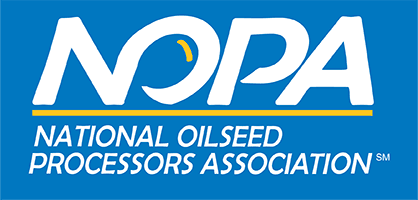20 Years of Progress: NOPA Applauds EPA’s Vision for U.S. Renewable Fuels Dominance
WASHINGTON, August 8, 2025 – The National Oilseed Processors Association (NOPA) today celebrated the 20th anniversary of the Renewable Fuel Standard (RFS), a landmark policy that has strengthened U.S. energy security, opened new markets for American farmers, and delivered long lasting economic benefits to rural communities. Marking the occasion, NOPA submitted formal comments supporting the Environmental Protection Agency’s (EPA) proposed RFS Renewable Volume Obligation (RVO) for 2026 and 2027.
Enacted in 2005 and expanded in 2007, the RFS has played a pivotal role in driving American energy independence and advancing the use of homegrown, renewable fuels produced from the crops of U.S farmers. Over the past two decades, the program has opened value‑added markets for U.S. soybeans and other oilseeds, catalyzed a step-change in commodity prices for farmers, and spurred investment in rural manufacturing. The program remains a cornerstone of U.S. agricultural policy and American energy dominance.
In its comments to the EPA, NOPA strongly supports:
- Increasing biomass‑based diesel volumes to 7.12 billion RINs in 2026 and 7.50 billion RINs in 2027, citing the S&P Global feedstock availability study commissioned by NOPA as strong evidence of the U.S. agricultural industry’s rapidly expanding capacity to meet feedstock needs for higher blending targets.
- A 50% RIN reduction for non‑U.S. feedstocks and finished fuels, prioritizing American-grown crops and domestic biofuel production. This measure puts U.S. farmers and workers first – aligning with the core intent of the RFS to build energy security through American agriculture, rural manufacturing jobs, and domestic feedstocks.
- The highest standard for evaluating Small Refinery Exemptions (SREs), emphasizing that exemptions should be rare, clearly justified under the Clean Air Act, and not undermine the integrity of biofuel blending requirements.
- Continued use of the 2020 RVO SRE accounting approach, preserving blending volumes by adjusting for any SREs that are granted, a mechanism that ensures the program delivers on its intended benefits for U.S. farmers.
“We commend the administration for ensuring that U.S. farmers and rural manufacturing jobs are at the center of America’s energy future,” said Devin Mogler, President and CEO of NOPA. “The biomass-based diesel volumes reflect the strength of American agriculture and the rapid expansion in soybean crush that has come online. This rule advances the twin goals of U.S. energy security and rural prosperity, and we support reducing RIN values for non‑U.S. feedstocks to ensure the program prioritizes soybeans and other crops produced here in the U.S. Likewise, ensuring that SREs are rare and subject to the highest standards preserves the integrity of the RFS and maximizes the benefits for U.S. producers and consumers alike.”
Entering its third decade, the RFS continues to benefit from the commitment of NOPA members to working with Congress, EPA, USDA, and other administrative agencies to strengthen the program and ensure U.S.-grown feedstocks remain central to innovation, energy security, and rural prosperity.
Read NOPA’s comments here.
###
Organized in 1930, the National Oilseed Processors Association (NOPA) represents the U.S. soybean, canola, flaxseed, safflower seed, and sunflower seed-crushing industries. NOPA’s membership is engaged in the processing of oilseeds for meal and oil that are utilized in the manufacturing of food, feed, renewable fuels, and industrial products. NOPA’s 20 member companies operate 71 softseed and soybean solvent extraction plants across 20 states, crushing over 99% of all soybeans processed in the United States, the equivalent to more than 2 billion bushels annually. More information at www.NOPA.org.
###

